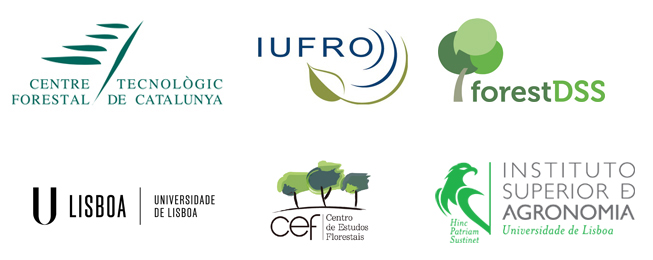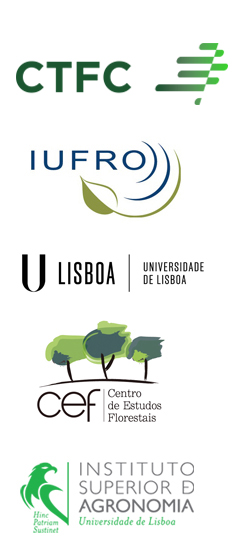Lisbon, 18th of February 2016
Purpose:
This international seminar will focus on the current state of knowledge on methods and tools that may be used by public administrators, forest owners and industry for enhanced integration of adaptive strategies in forest management planning as well as in policy analysis in a context of global change. It will also show state of the art research in the different in different institutions participating in the SuFoRun international project.
The seminar is organized by SuFoRun R&D project (https://suforun.ctfc.cat/)
SuFoRun is focused on forestry and climate change interactions, including the development of adaptive forest management tools. The SuFoRUn consortium is built to include highly qualified research institutions in nine countries (i.e. Spain, Portugal, Finland, Sweden, Costa Rica, Chile, Brazil and USA) that share complementary interests in key scientific disciplines for the development of the forest sector. The project will serve to exchange and generate knowledge on multipurpose forests, addressing risk and uncertainty and the development of knowledge on methods and tools to support policy analysis and development in a context of global change. The project strengthens research collaboration through active networking, staff exchange and dissemination activities between the participants.
Scientific Program:
- 9:00 – 9: 15 – Welcome and presentation of the seminar.
- 9: 15 – 9:30 – Brief presentation of the SuFoRun project to the general public.
- 9:30 – 10:30 Session I.
Presentations by each institution coordinator/deputy introducing their main research and methods and models developed in their countries:
- From timber supply to ecosystem sustainability: the Portuguese experience of addressing the evolving forest management planning paradigm. José Borges (ISA, Portugal).
- Jordi Garcia-Gonzalo (Centre Tecnológic Forestal de Catalunya, Spain)
- Luís Díaz Balteiro (Polytechnic University of Madrid, Spain)
- Cristóbal Pais (University of Chile, Chile)
- Paulina Fernández (Catholic University of Chile).
- Eva-Maria Norsdtrom (SLU, Sweden)
- 10:30 – 10:45. Coffee Break
- 10:45 – 11:30. Session II.
Presentations by each institution coordinator/deputy introducing their main research and methods and models developed in their countries:
- Bastiaan Louman (Centro Agronómico Tropical de Investigación y Enseñanza, CATIE, Costa Rica)
- An Overview of Climate-Related Research at the University of Washington’s Spatial Optimization Lab. Sandor Toth (University of Washington, USA).
- Rasoul Yousefpour, (University of Freiburg, Germany)
- Antti Kilpeläinen (University of Eastern Finland. Finland)
- 11:30 – 11:45 Break
- 11:45 – 12:30 Session III
- Multiple criteria approaches to forest management – recent advances and open problems. José Borges (ISA, Portugal)
- Dealing with risks and uncertainties in decision-making process. Rasoul Yousefpour, (University of Freiburg, Germany).
- Sustainability of forest systems: An approach using quantitative techniques. Luís Díaz Balteiro (Polytechnic University of Madrid, Spain)
- Planning forest harvesting under climate change: a Stochastic Optimization Model. Jordi Garcia (CTFC, Spain)
- Multi-criteria Optimization for Forest Ecosystem Services under Different Climate Scenarios. Sandor Toth (University of Washington, USA).
- 12:45 – 14:30 Lunch
- 14:30 – 16:00 Session IV
- Stochastic models in forestry. Cristóbal Pais (Universidad de Chile)
- Modeling in support of ecosystem service restauration and management in forest landscapes. Bastiaan Louman (CATIE, Costa Rica).
- Forest ecosystem modelling and multi-functional management planning tools: development and application in boreal forestry Kilpeläinen, Peltola & Pukkala. (University of Eastern Finland, Finland).
- Better forest logistics and operations, linked with strategic forest management plans. Alexandra Marques. (INESC-Porto)
- Current and future development of the EMDS system relevant to SuFoRun. Keith Reynolds (USDA, USA)
- Still to be updated
- 16:00 – 16: 15 Cofee Break
- 16:15 – 17:30 Open discussion on linkages/synergies to ongoing research or education projects.
Organizing team:
- José Borges. Instituto Superior de Agronomia (ISA), Lisbon, Portugal.
- Jordi Garcia-Gonzalo. Centre Tecnològic Forestal de Catalunya (CTFC), Solsona, Spain
- Andrea Teixeira. Instituto Superior de Agronomia (ISA), Lisbon, Portugal.
Scientific committee:
- José Borges (Instituto Superior de Agronomia, Portugal)
- Jordi Garcia-Gonzalo (Centre Tecnológic Forestal de Catalunya, Spain)
- Andrés Weintraub (University of Chile, Santiago de Chile, Chile).
- Paulina Fernández (Catholic University of Chile. Santiago de Chile. Chile)
- Sandor Toth (University of Washington (UW). Seattle. USA)
- Bastiaan Louman. (CATIE, Costa Rica).
- Keith Reynolds. (USDA, USA).
- Marc McDill (Pennsylvania State University (PSU). USA)
- Luís Díaz Balteiro (Polytechnic University of Madrid, Spain)
- Cristóbal Pais (University of Chile, Chile)
- Eva-Maria Nordstrom (SLU, Sweden)
- Rasoul Yousefpour, (University of Freiburg, Germany)
- Antti Kilpeläinen (University of Eastern Finland. Finland)
- Heli Peltola (University of Eastern Finland. Finland)
- Ljusk Ola Eriksson (SLU, Sweden)
Attendance and participation:
Fees & Registration
Fees: The seminar will be free of charge.
Registration: Attendants must confirm their attendance to the seminar until 3rd of February. Be aware that the total audience is limited and the acceptance will be done by order of confirmation. To register send an email to: j.garcia@ctfc.es and to ateixeira@isa.ulisboa.pt.
Practical information
Venue
Instituto Superior de Agronomia
Tapada da Ajuda,
1349-017 Lisboa,
Portugal
The seminar will be at the Instituto Superior de Agronomia. The meeting room will be the “Sala de Atos” located in the main building. The Instituto Superior de Agronomia is located in Lisbon in Tapada da Ajuda (in Calçada of Tapada) between Monsanto and Alcântara (near Largo do Calvário, which is a small square, and by the side of the bridge over the Tagus, called “25th of April”).



